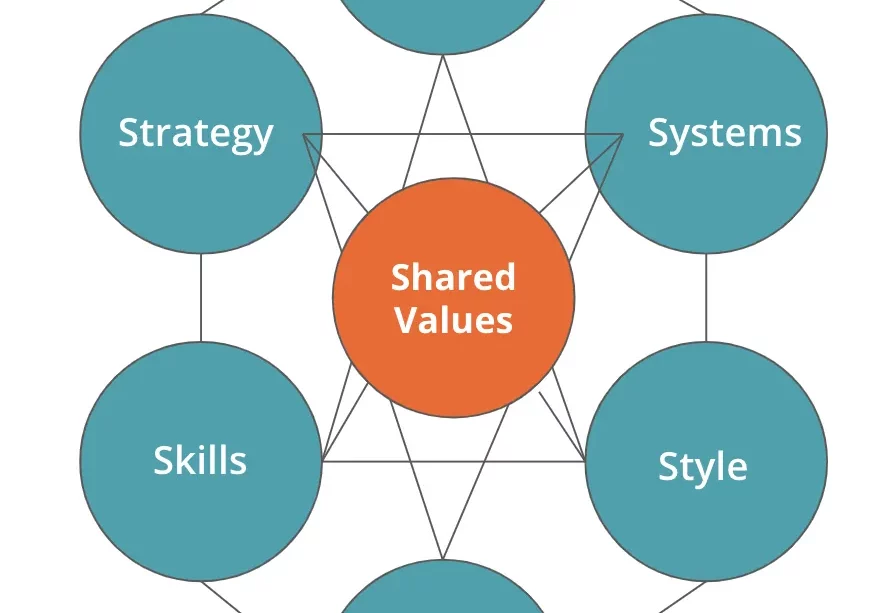McKinsey 7s versus modern day AI strategies
Understanding the McKinsey 7s Framework
The McKinsey 7s framework, developed in the late 1970s by consultants at McKinsey & Company, is a management model designed to analyze and improve organizational effectiveness. The framework identifies seven key elements that need to be aligned for an organization to be successful. These elements are: Strategy, Structure, Systems, Staff, Skills, Style, and Shared Values.
Strategy
Strategy refers to the plan devised to maintain and build a competitive advantage over competitors. It involves critical decisions about the allocation of resources, market positioning, and competitive actions.
Structure
Structure is how the organization is arranged, including the hierarchy and departmentalization. The organization’s structure affects the execution of its strategy and the speed of decision-making.
Systems
Systems are the daily activities and procedures that staff members engage in to get the job done. Effective systems are crucial for smooth operations and achieving strategic objectives.
Staff
Staff refers to the people within the organization and their general capabilities. It encompasses workforce requirements and talent management strategies.
Skills
Skills are the actual competencies and capabilities of the employees. This element assesses whether the staff has the right skills to achieve organizational goals.
Style
Style is the leadership approach of top management and the overall corporate culture. It shapes how employees behave and interact within the organization.
Shared Values
Shared Values are the core beliefs and norms that guide the behavior of everyone in the organization. These values are the foundation of the company culture and influence every other element in the McKinsey 7s framework.
The Emergence of AI Strategies
AI-powered Marketing Strategy
An AI marketing strategy uses artificial intelligence to make data-driven decisions about marketing efforts. AI tools analyze large datasets to uncover patterns and insights that would be hard for humans to identify. This improves the ability to create effective marketing strategies and adapt quickly to market changes.
Data-driven Insights
AI strategies rely on data. By using data analytics, AI tools provide actionable insights into customer behavior, market trends, and campaign performance. This data-driven approach helps marketers make informed decisions, leading to more successful marketing efforts.
Marketing Automation
Automation is a key part of AI strategies. Marketing automation tools handle repetitive tasks like email marketing, social media posting, and lead nurturing. This frees up marketing teams to focus on more strategic activities and boosts overall efficiency.
Project Management Integration
Comparing McKinsey 7s and AI Strategies
Alignment of Strategy and Structure
The McKinsey 7s framework highlights the importance of aligning strategy and structure. Similarly, AI strategies require an organizational structure that supports data-driven decision-making and embraces technological advancements.
Systems and Automation
The systems element in the McKinsey 7s framework corresponds to the automation aspect of AI strategies. Effective systems and processes are crucial for both frameworks. While McKinsey 7s focuses on refining existing systems, AI strategies seek to enhance and automate these systems for better efficiency.
Skills and AI-Driven Capabilities
Both frameworks emphasize the importance of skills. While the McKinsey 7s framework focuses on the skills and capabilities of employees, AI strategies require a workforce that is proficient in leveraging AI tools and technologies. Continuous learning and development are essential to keep pace with AI advancements.
Shared Values and Data-driven Culture
Shared values in the McKinsey 7s framework align with the cultural shift required for successful AI strategy implementation. Organizations need to foster a data-driven culture where decisions are based on insights derived from AI and analytics.
Leadership and AI Adoption
The leadership style element in the McKinsey 7s framework plays a crucial role in the adoption of AI strategies. Effective leadership is necessary to drive change, encourage innovation, and ensure successful AI integration within the organization.


